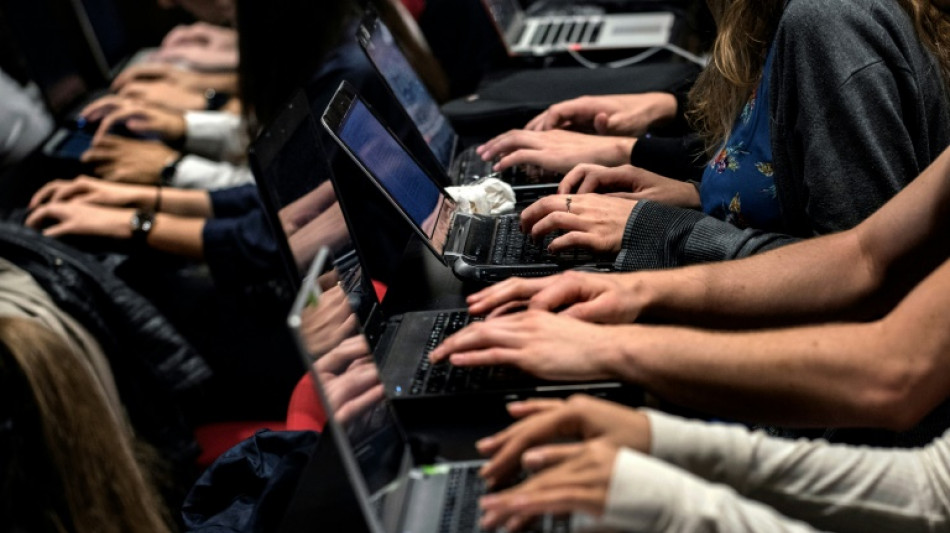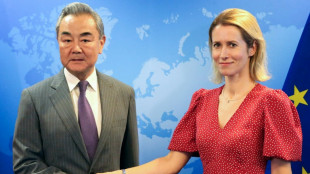
-
 China, EU should not 'seek confrontation': FM Wang
China, EU should not 'seek confrontation': FM Wang
-
'Big Comrade': Former defence chief takes reins as Thai PM

-
 4 dead, 38 missing after ferry sinks on way to Indonesia's Bali
4 dead, 38 missing after ferry sinks on way to Indonesia's Bali
-
Thailand set for another acting PM after cabinet reshuffle

-
 In US capital, Trump tariffs bite into restaurant profits
In US capital, Trump tariffs bite into restaurant profits
-
Sean Combs: music pioneer, entrepreneur -- and convicted felon

-
 In California, fear of racial profiling grips Latino communities
In California, fear of racial profiling grips Latino communities
-
Home-grown players delight Wimbledon fans on hunt for 'new Andy Murray'

-
 Third-ever confirmed interstellar object blazing through Solar System
Third-ever confirmed interstellar object blazing through Solar System
-
Joao Pedro arrival boosts Chelsea ahead of Palmeiras Club World Cup test

-
 Lions start to roar in ominous Wallabies warning
Lions start to roar in ominous Wallabies warning
-
Kellaway, Tupou headline Waratahs team to face Lions

-
 Four All Blacks debutants to face France in first Test
Four All Blacks debutants to face France in first Test
-
Ukraine scrambling for clarity as US downplays halt to arms shipments

-
 Peru clinic that leaked Shakira medical record given hefty fine
Peru clinic that leaked Shakira medical record given hefty fine
-
UK's Starmer backs finance minister after tears in parliament

-
 Trump tax bill stalled by Republican rebellion in Congress
Trump tax bill stalled by Republican rebellion in Congress
-
US stocks back at records as oil prices rally

-
 Norway battle back to beat Swiss hosts in Euro 2025 opener
Norway battle back to beat Swiss hosts in Euro 2025 opener
-
Netanyahu vows to uproot Hamas as ceasefire proposals are discussed

-
 Tarvet won't turn pro yet, despite pushing Alcaraz at Wimbledon
Tarvet won't turn pro yet, despite pushing Alcaraz at Wimbledon
-
Ukraine left scrambling after US says halting some arms shipments

-
 India captain Gill's hundred repels England in second Test
India captain Gill's hundred repels England in second Test
-
Possible interstellar object spotted zooming through Solar System

-
 Alcaraz ends Tarvet's Wimbledon adventure, Paolini crashes out
Alcaraz ends Tarvet's Wimbledon adventure, Paolini crashes out
-
Why is there no life on Mars? Rover finds a clue

-
 Former finalist Paolini stunned as Wimbledon seeds continue to fall
Former finalist Paolini stunned as Wimbledon seeds continue to fall
-
Tesla reports lower car sales, extending slump

-
 Finland open Women's Euro 2025 with win over Iceland
Finland open Women's Euro 2025 with win over Iceland
-
India captain Gill hits another hundred against England in 2nd Test

-
 Hamas mulls truce proposals after Trump Gaza ceasefire push
Hamas mulls truce proposals after Trump Gaza ceasefire push
-
Alcaraz ends Tarvet's Wimbledon adventure, Sabalenka advances

-
 Tears, prayers, exultation: Diddy radiates relief after partial acquittal
Tears, prayers, exultation: Diddy radiates relief after partial acquittal
-
Ruthless Alcaraz ends Tarvet's Wimbledon fairytale

-
 Bangladesh collapse in ODI series opener to hand Sri Lanka big win
Bangladesh collapse in ODI series opener to hand Sri Lanka big win
-
Trump says Vietnam to face 20% tariff under 'great' deal

-
 US senator urges bribery probe over Trump-Paramount settlement
US senator urges bribery probe over Trump-Paramount settlement
-
Nazi-sympathising singer's huge gig to paralyse Zagreb

-
 Germany swelters as European heatwave moves eastwards
Germany swelters as European heatwave moves eastwards
-
Sabalenka tells troubled Zverev to talk to family about mental health issues

-
 Hong Kong govt proposes limited recognition of same-sex couples' rights
Hong Kong govt proposes limited recognition of same-sex couples' rights
-
Wall Street shrugs off drop US private sector jobs

-
 Spain star Bonmati recovering well from meningitis, says coach Tome
Spain star Bonmati recovering well from meningitis, says coach Tome
-
Pogacar must 'battle' for Tour de France title says director

-
 Tesla reports lower car sales but figures better than feared
Tesla reports lower car sales but figures better than feared
-
Alcaraz aims to avoid Wimbledon giant-killing after Sabalenka wins

-
 England captain Stokes makes Jaiswal breakthrough in second Test
England captain Stokes makes Jaiswal breakthrough in second Test
-
Sean 'Diddy' Combs acquitted of sex trafficking, convicted on lesser charge

-
 Sabalenka praying for no more Wimbledon upsets after battling win
Sabalenka praying for no more Wimbledon upsets after battling win
-
Hamas says discussing proposals after Trump Gaza ceasefire push


'Writing is thinking': do students who use ChatGPT learn less?
When Jocelyn Leitzinger had her university students write about times in their lives they had witnessed discrimination, she noticed that a woman named Sally was the victim in many of the stories.
"It was very clear that ChatGPT had decided this is a common woman's name," said Leitzinger, who teaches an undergraduate class on business and society at the University of Illinois in Chicago.
"They weren't even coming up with their own anecdotal stories about their own lives," she told AFP.
Leitzinger estimated that around half of her 180 students used ChatGPT inappropriately at some point last semester -- including when writing about the ethics of artificial intelligence (AI), which she called both "ironic" and "mind-boggling".
So she was not surprised by recent research which suggested that students who use ChatGPT to write essays engage in less critical thinking.
The preprint study, which has not been peer-reviewed, was shared widely online and clearly struck a chord with some frustrated educators.
The team of MIT researchers behind the paper have received more than 3,000 emails from teachers of all stripes since it was published online last month, lead author Nataliya Kosmyna told AFP.
- 'Soulless' AI essays -
For the small study, 54 adult students from the greater Boston area were split into three groups. One group used ChatGPT to write 20-minute essays, one used a search engine, and the final group had to make do with only their brains.
The researchers used EEG devices to measure the brain activity of the students, and two teachers marked the essays.
The ChatGPT users scored significantly worse than the brain-only group on all levels. The EEG showed that different areas of their brains connected to each other less often.
And more than 80 percent of the ChatGPT group could not quote anything from the essay they had just written, compared to around 10 percent of the other two groups.
By the third session, the ChatGPT group appeared to be mostly focused on copying and pasting.
The teachers said they could easily spot the "soulless" ChatGPT essays because they had good grammar and structure but lacked creativity, personality and insight.
However Kosmyna pushed back against media reports claiming the paper showed that using ChatGPT made people lazier or more stupid.
She pointed to the fourth session, when the brain-only group used ChatGPT to write their essay and displayed even higher levels of neural connectivity.
Kosmyna emphasised it was too early to draw conclusions from the study's small sample size but called for more research into how AI tools could be used more carefully to help learning.
Ashley Juavinett, a neuroscientist at the University of California San Diego who was not involved in the research, criticised some "offbase" headlines that wrongly extrapolated from the preprint.
"This paper does not contain enough evidence nor the methodological rigour to make any claims about the neural impact of using LLMs (large language models such as ChatGPT) on our brains," she told AFP.
- Thinking outside the bot -
Leitzinger said the research reflected how she had seen student essays change since ChatGPT was released in 2022, as both spelling errors and authentic insight became less common.
Sometimes students do not even change the font when they copy and paste from ChatGPT, she said.
But Leitzinger called for empathy for students, saying they can get confused when the use of AI is being encouraged by universities in some classes but is banned in others.
The usefulness of new AI tools is sometimes compared to the introduction of calculators, which required educators to change their ways.
But Leitzinger worried that students do not need to know anything about a subject before pasting their essay question into ChatGPT, skipping several important steps in the process of learning.
A student at a British university in his early 20s who wanted to remain anonymous told AFP he found ChatGPT was a useful tool for compiling lecture notes, searching the internet and generating ideas.
"I think that using ChatGPT to write your work for you is not right because it's not what you're supposed to be at university for," he said.
The problem goes beyond high school and university students.
Academic journals are struggling to cope with a massive influx of AI-generated scientific papers. Book publishing is also not immune, with one startup planning to pump out 8,000 AI-written books a year.
"Writing is thinking, thinking is writing, and when we eliminate that process, what does that mean for thinking?" Leitzinger asked.
G.AbuGhazaleh--SF-PST

